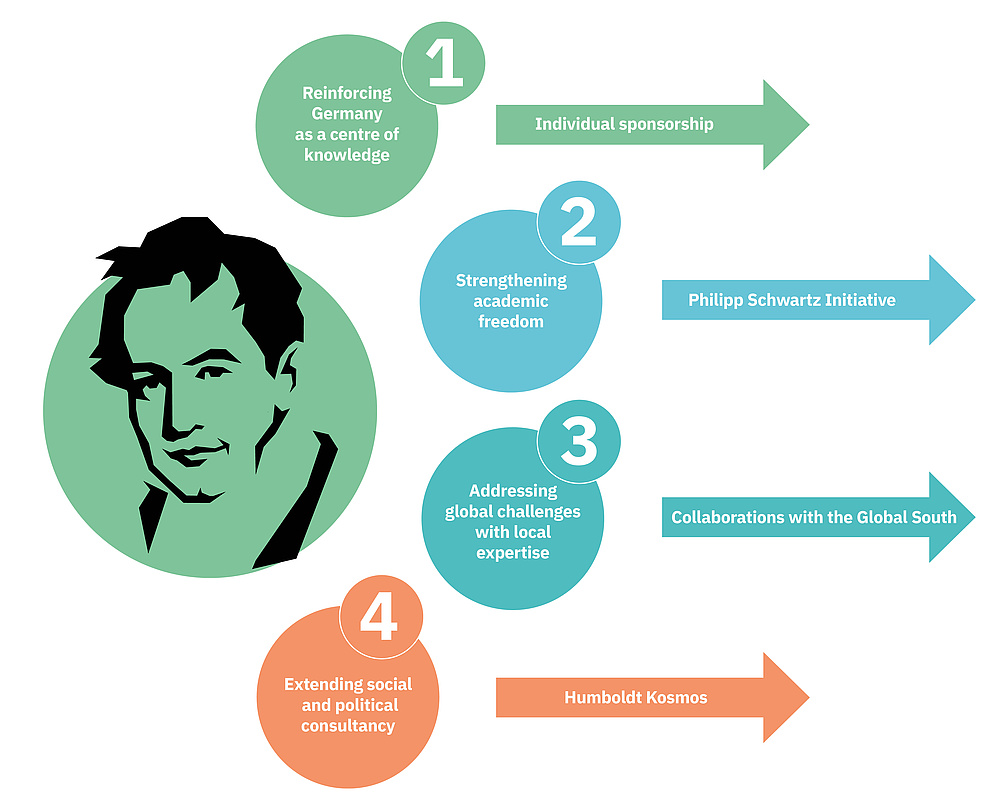
Contact
Press, Communications and Marketing
Tel.: +49 228 833-144
Fax: +49 228 833-441
presse[at]avh.de

The Alexander von Humboldt Foundation has defined the focal areas of its work through the end of 2028 in a new strategy that has been approved by the Board of Trustees. With this strategy the Foundation will continue to develop and expand its individual cross-country, cross-disciplinary support for outstanding researchers and adjust its support to fit conditions that are changing globally.
The new strategy is the fruit of Humboldt Foundation President Robert Schlögl’s first year in office and was decisively shaped by him. “The Foundation sees the core of its work as advancing the sciences while requiring high quality standards from its researchers. This and our dependability over the years constitute our value; both offer benefits for our country. We consider these benefits to be a cultural service and we generate them without insisting on their use for a specific purpose. With our new strategy, these benefits will be expanded by the dimension of open science diplomacy”, said Robert Schlögl. “In light of our changing world, we are actively bringing into German discourses our network’s treasure trove of knowledge and expertise for various target groups.”

The four goals
Targeting the objectives of the Foundation’s work, the new strategy will strengthen the following four areas: Germany as a location for research and scholarship, academic and scientific freedom and the protection of researchers at risk, cooperation with the Global South, and advising society and the political sphere.
1. Reinforcing Germany as a centre of knowledge
The Humboldt Foundation recruits outstanding international researchers for long-term collaborative projects with Germany. To promote Germany as a location for conducting research, the Foundation plans to, for example, launch innovation and translation fellowships and, working as a matchmaker along the interface between industry and science, attract highly specialised professionals to Germany. Looking at the Foundation’s selection and funding systems, the new strategy seeks to eliminate structural disadvantages and shape processes to ensure even greater equality of opportunity where possible.
2. Strengthening academic freedom and protecting researchers at risk
The Humboldt Foundation views academic and scientific freedom as the basis for academic and scientific quality, creativity and innovation. The Foundation’s robust defence of liberal-democratic values means that the Philipp Schwartz Initiative for researchers at risk will continue to be an indispensable instrument in its toolkit. But the Foundation also works to ensure greater reliability in its international collaborations.
3. Addressing global challenges with local expertise
In its collaborative activities with the Global South, the Foundation learns from its local and regional networks. Convinced that worldwide challenges can only be addressed globally and by drawing upon local expertise, the Foundation promotes research that is relevant to development. The focus in these activities is on the systemic benefits for the researchers’ native regions that arise from the research work done by individuals sponsored by the Foundation.
4. Extending societal and political consultancy – expanding the Humboldt Kosmos
Society and the political sphere profit from Humboldtians’ expertise. The Foundation’s Humboldt Kosmos format provides an umbrella for fact-based consulting. Science diplomacy as two-way communication: The knowledge and expertise within the Humboldt Network are to be carried into the world and the knowledge and expertise in the world are to be brought to Germany.
Every year, the Alexander von Humboldt Foundation enables more than 2,000 researchers from all over the world to spend time conducting research in Germany. The Foundation maintains an interdisciplinary network of well over 30,000 Humboldtians in more than 140 countries around the world – including 63 Nobel Prize winners.
